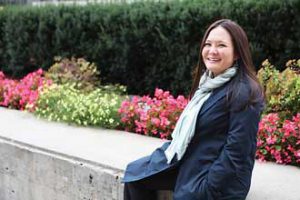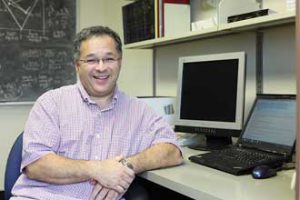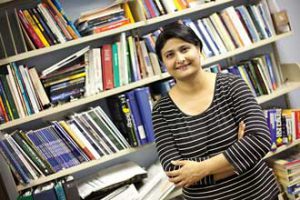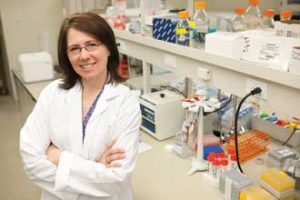
McGill has been able to attract exceptional faculty from around the world since our founding in 1821. Over the past five years alone, over 500 new tenure track staff have been hired in one of the most intense recruitment efforts among universities of our size in North America. The following nine newcomers represent just a sampling of the rich crop of new professors who promise to add to the breadth of scholarship within the McGill community.
Zoua Vang, Assistant Professor of Sociology
Hometown: Born in a jungle in Laos, Vang entered the U.S. as a refugee at age four with her family.
Coming to McGill from: PhD from Harvard; two-year post doc at the University of Pennsylvania.
Research interests: I specialize in immigration integration – how different receiving contexts interact with immigrants’ characteristics to either lead them to integrate well into society or lead them to social exclusion.
How will your work benefit the average person? Basically, the reason I got involved in academic research in the first place is because I believe that it can be used to improve the lives of disadvantaged people. So while my research does not focus on policy per se, I always try to engage in meaningful projects that can have some practical application and that policymakers could use to inform initiatives.
When did you know you wanted to follow this career path? I was a refugee in the U.S. so these issues of immigration and integration have always had a personal significance for me.
What would you like to accomplish in the next 10 years? If my research has contributed even a tiny bit to a policy or initiative that improves the lives of disadvantaged, vulnerable populations, I’d be pretty happy. And that is partly why some of my new research initiatives have shifted towards more ‘practical/applied’ areas such as health inequality. I mean, it’s more feasible to try and institute a program to assist poor or immigrant mothers to reduce the risk of infant death than to try and tackle such a huge social issue like ‘race relations,’ right?
Last book read: I re-read East of Eden.
How do you relax: I jog and paint landscapes.
What’s on your iPod: 1980s bands, Michael Jackson and Madonna.

Christian Genest, Professor, Dept. of Mathematics and Statistics
Hometown: Chicoutimi, Que.
Coming to McGill from: Université Laval (1987-2010).
Research Interests: Early in my career, I was interested in the statistical aspects of consensus formation and group decision-making. Later on, I also contributed to the study of paired comparison methods for prioritizing issues and projects. However, I am best known for developing nonparametric inference tools for a new, flexible class of stochastic models based on “copulas” which are used to analyze the dependence relations between variables in large data sets. With my students and collaborators, I designed estimators, tests and other diagnostic tools for this class of models.
How will your work benefit the average person? I fostered these techniques in actuarial science, finance and hydrology by showing how accounting for dependence between insurance claims, financial assets or extreme hydrological events improves risk management and public safety.
Why McGill? These are exciting times in the Department of Mathematics and Statistics. Under the chairship of Jacques Hurtubise, over 25 per cent of the faculty have been renewed in the past two years, including four hirings in probability and statistics. There is a real potential here for a hub of statistical research. In the past, statisticians in the department have had close ties with their counterparts in biostatistics and epidemiology, psychology and medicine. These relations need to be nurtured and expanded to include other natural areas of interaction for statisticians, such as economics, finance and the social sciences. There is a great deal going on in these fields at McGill and in the Montreal area, and I would like our group to be part of it.
What do you do to relax? I like reading about history. I also like to walk or hike and go to various cultural and sporting events. I also like travelling, cinema and music. For many years I was involved in the community as a baseball coach and umpire.

David Rothwell, Assistant Professor, School of Social Work
Hometown: Portland, Oregon
Coming to McGill from: I did my grad work at the University of Hawaii and my post doc at the National University of Singapore.
Research interests: My research and teaching fall under poverty and social welfare policy. Within welfare policy circles, much of the focus has been on income maintenance or cash-transfer programs such as tax benefits and month-to-month social assistance cheques from the government.
After 50 years of making little progress against poverty with these maintenance approaches, people are beginning to look at the role that other economic resources play in welfare and wellbeing. Most of my work is in evaluating asset-based welfare programs and their impact on social and economic mobility. I also look at the influence of assets on family dynamics.
Your most exciting professional moment thus far?My dissertation of 2008 was pretty ambitious because it was the first study to look at the impact of one of these interventions among native Hawaiian people. Since then the study has been used by policy makers at the state level in Hawaii to advocate for more access to financial services among low-income people.
What would you like to accomplish in the next 10 years? I’d like to bring asset-based frameworks to the forefront in the way we think about and address poverty here in Quebec and Canada.
How do you relax when you’re not at work?
I like jogging, biking and playing volleyball. Winter sports will be a new thing for me, but I’m game to try. People will find it hilarious to watch me try to skate for the first time.
Last book read? Champlain’s Dream by David Hackett Fischer
What’s on your iPod? Medeski, Martin and Wood, Ben Harper and a band called Dispatch.

Chris Solomon, Assistant Professor, Dept. of Natural Resource Sciences
Hometown: Coventry, Connecticut
Coming to McGill from: The University of Wisconsin, where I did my PhD and post-doc work.
Research interests: The food web and ecosystem dynamics of lakes and other aquatic ecosystems.
Basically I study lakes and things that live in them. I try to understand how connections between different habitats, and even between lakes and their surrounding watersheds, influence fish populations, carbon dioxide fluxes to the atmosphere, and other aspects of lake ecosystems.
How will your work benefit the average person? People use lakes in a lot of ways, particularly in lake-rich landscapes like Quebec. And one of the big ways they use them is for recreational fisheries. So that’s sort of one of the driving questions, to understand what supports those fish, what the food web processes are that lead to the fish that you catch in the lake.
When did you know you wanted to follow this career path? In high school, thanks to a very committed and inspirational biology teacher.
Your most exciting professional moment thus far? Seeing some of my work applied directly to resource management and policy while I was in Wisconsin.
Where do you want to be in 10 years? I hope to have improved our understanding of cross-habitat linkages in food webs and carbon cycling in lake-rich landscapes, and to have contributed scientific knowledge to the conservation and management of aquatic resources here in Quebec.
Why McGill? My family and I had been hoping to move back to this part of the world, and this seemed like a great job at a great university in a great city.
How do you relax when you aren’t at work? I like to fish, canoe, ride my bike, that kind of thing. [There was no room for his canoe at his apartment in Mile End, so a colleague on the Macdonald Campus is storing it for him].
Last book read? Out Stealing Horses, by Per Petterson
What’s on your iPod?: Nothing! I haven’t had time to put any music on there yet!

Anaïs Salamon, Head Librarian, Islamic Studies Library
Hometown: Born in Morocco grew up in Provence, France
Coming to McGill from: I was working at Harvard for their Open Collections Program (Islamic Heritage Project), a manuscript digitization project.
Research interests: I’ve been interested in cataloguing non-Roman script materials such as Arabic, which present particular challenges. Most display software has been designed for Roman script which cannot read the orientation of many non-Roman scripts such as Arabic, Hebrew and Chinese which, in the former cases are written right to left and top to bottom in the latter. While at Harvard, I worked on manuscript viewer software that facilitates the display and search capabilities of manuscripts which have been digitized making it easier to search and manage of meta-data.
When did you know you wanted to follow this career path? It’s was all a bit haphazard, to be honest. I decided to study Arabic when I was 14 and went to a boarding school to do that. I still don’t really know why I was interested. I also wanted to travel, which was really was my first motivation. I’ve never regretted it because I’ve been able to travel a lot. I wanted to do something with the Arabic I had spent so many years studying and I am a big reader. I was not drawn to teaching and I realized there was another option and that was to become a librarian.
Most exciting professional moment thus far? I spent four years working at the Library of the Dominican Institute for Oriental Studies in Cairo, Egypt on a cataloguing project. When I arrived, nothing had been catalogued electronically, so we created special software. When I left, we had managed to catalogue nearly all the collections, which included 150,000 books.
Where do you want to be in 10 years? It’s hard to say. I haven’t really qualified my life that way. I didn’t expect to be where I am. I would be happy wherever I end up. If I am still here at McGill, I will be happy, if life decides otherwise I will be happy.
How do you relax when you aren’t at work? I read a lot of novels and I’m a big fan of cinema.
Last book read? I really like Nancy Huston’s most recent, Infrarouge.

Patricia Faison Hewlin, Assistant Professor, Desautels Faculty of Management
Hometown: Laurelton, Queens, New York
Coming to McGill from: McDonough School of Business at Georgetown University
Research interests: Prior to joining academia, I was a Vice-President in the Consumer Banking Division for a very large bank in New York. As a manager, I found it intriguing to witness how individuals navigate organizational life, especially with respect to impression management. Since that time, I have conducted research to explore when and why individuals may feel pressured to suppress aspects about themselves, as well as divergent values and ideas in order to gain acceptance and succeed in the workplace. My research centres on these issues, with a particular emphasis on the role of organizational values and the impact of creating facades of conformity on work performance and organizational outcomes.
Why McGill? Simply stated, McGill is an exceptional university. The diverse body of faculty, administrators and students sets McGill apart from others and adds richness to its quest for research and teaching excellence. I am also very impressed with McGill’s commitment to making a positive impact on various facets of society in Quebec.
Most exciting professional moment thus far? It is important to me that research not only contributes to scholarly thought, but it equips employees and managers with tools for enhancing well-being and productivity in the workplace. Engaging in field research where I am able to interact with employees and managers is, therefore, a very exciting aspect of what I do. It never gets stale. What’s even more exciting is hearing from them that my research resonates with their work experiences.
How do you relax when you aren’t at work? I spend time with my family. I have a three-year-old daughter and husband. As new residents of Montreal, Jay, Jaidyn, and I are quite busy exploring and learning the new culture and language. It’s been fun.
What’s on your iPod? I have not succumbed to the iPod craze, but I do have a pretty eclectic taste for music. My CD collection includes a wide set of genres including classical, jazz, gospel, rock, Latin, and R&B music.

Anila Asghar, Assistant Professor, Dept. of Integrated Studies in Education
Hometown: Lahore, Pakistan
Coming to McGill from: Johns Hopkins University, Baltimore, Maryland
Research Interests: I’ve been mostly interested in research related to cognitive development and conceptual changes that [high school through to University] students and teachers experience when they engage with science and how they develop an understanding of science.
How will your work benefit the average person?
Recently, Islamic creationism seems to be on the rise in many Muslim countries. So, our work will contribute to the literature – informing academics and educators about the ways in which this issue is being played out in Muslim communities. But more than that, it fosters exchange between different cultures – about modern science and how people in different parts of the world are responding to it and thinking about it. It brings people together.
Why McGill? I had a great time here when I was a post-doctoral fellow. Montreal is home to me. This position offered me a great opportunity to come back.
When did you know you wanted to follow this career path? I have been interested in the issues of science education and learning for many years. While I was a PhD student at Harvard, Brian Alters came to give a talk on his research on evolution and creationism in North America. I became very interested in looking at this issue in Muslim culture. So, I just walked right up to him after his talk and told him I was interested. So, when I finished my PhD [on cognitive and emotional development in science teacher education], I came here to work with Dr. Alters as a post-doc.
Where do you want to be in 10 years? I would like to work with local schools here in Montreal. I would like to be able to contribute to science education with some effective curricula that promotes teacher and student learning in science. I hope to continue this research around Islam and evolution and religion.
How do you relax when you aren’t at work? I listen to music. I read stories to my 7-year-old son. Cooking helps me to unwind. I get a lot of my ideas when I’m chopping onions.
Last book read? Songs of Blood and Sword – A Daughtor’s Memoir by Fatima Bhutto.
What’s on your iPod? Folk music from South Asia.

François Bouffard, Assistant Professor, Dept. of Electrical and Computer Engineering
Hometown: Born in Sherbrooke and raised in Magog, Que. Moved to Montreal at 18 to study at McGill
Coming to McGill from: I was a lecturer in the School of Electrical & Electronic Engineering at The University of Manchester, UK for four years.
Research interests: I’m looking at the contexts in which we can mitigate climate change by understanding the inherent flexibility in power systems, especially by electricity consumers, so that we may better integrate carbon-free energy (solar and wind power, neither of which is controllable) into the electricity supply. I also do more general power system planning and operations research developing tools for system operators that should allow them to use the sun and the wind more reliably and cheaply.
How will your research benefit the average person? I’m looking at how people consume electricity in their everyday lives such as with household appliances. My research could ultimately have an impact on electricity consumption through applications and incentives signaling them about when they can make the most of wind and solar power – like knowing the best time to do laundry or charge the electric car – so they can take advantage of essentially free and carbon-free energy.
When did you know you wanted to follow this career path? I started my studies in electrical engineering with an interest in telecommunications, but during my undergrad years I developed an interest in energy. I had inspiring professors (who are still here) and my interests grew from there. My innate curiosity in research is why I stayed on and then I developed a keen interest in teaching. My job fits like a very nice glove.
Most exciting professional moment thus far? I’ve had a few, including a mid-term presentation I did on a 16-million Euro project co-funded by the European Commission. I had to do some out-of-the-box thinking to present scenarios about how Europeans might be using electricity in 2020, 2030 and 2050. I had to show how electricity demand could be made more flexible and how it could be used in the future running of smarter electricity grids. We worked with environmental psychologists, economists and engineers to learn how everyone from a CEO of a company to someone preparing a cup of tea and getting ready to catch their favourite TV show might reflect on how they use electricity and how renewable resources might be integrated into those activities.
How do you relax when you aren’t at work? I have two young kids – three years old and five months – so I try to go for a run if I can get out of the house.
Last book read? Garbriel Garcia Marquez’ One Hundred Years of Solitude in Spanish – for the second time.
What’s on your iPod? DJ Champion’s last album. With two kids it’s hard to keep up with the flow. I used to.

Carolyn Baglole, Assistant Professor, Dept. of Medicine, Meakins-Christie Laboratories
Hometown: Summerside, P.E.I
Coming to McGill from: University of Rochester, Rochester, New York.
Research Interests: My research interests lie in understanding, at the cellular and molecular level, novel pathways that control some of the lung damage caused by cigarette smoke.
How will your work benefit the average person? Cigarette smoke is still a huge problem worldwide. Lung damage caused by cigarette smoke is the foremost preventable cause of death and disease among Canadians and people worldwide. There really hasn’t been a major advance in terms of new therapeutics with which to treat some of these lung diseases.
Why McGill? McGill has an excellent respiratory research group at the Meakins-Christie Laboratory. When I was looking for a faculty position, my goal was to continue my research looking at cigarette smoke, inflammation and lung disease and I really wanted to be in the right environment. Upon looking at universities in Canada, it really was an excellent fit research-wise. I felt I would have the best opportunities for collaboration while being in a supportive and world-class research university.
Your most exciting professional moment thus far? Getting my first research grant in 2009. That was a milestone!
Where do you want to be in 10 years? I’d like to be doing what I’m doing now. I’d like to have established a research lab that provides an engaging and interesting environment for new trainees. I’d like to get new students really excited about research – especially in Canada. I think we can do some really great things. I certainly see myself at McGill and still contributing to our understanding of basic biological processes and how they can be applied to diseases that affect so many Canadians.
How do you relax when you aren’t at work? I like to do what my children like to do. We try to plan family time on weekends. I have two little girls (ages 6 and 3), so, things like skating.
Last book read? I really like Anne Rice. The last book that wasn’t work-related was The Witching Hour.
What’s on your iPod? I have a whole mix of music on my iPhone. Everything from Vivaldi to Great Big Sea to U2…it really runs the gamut!
